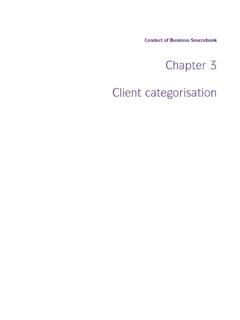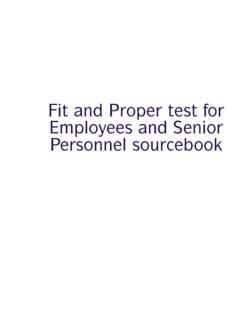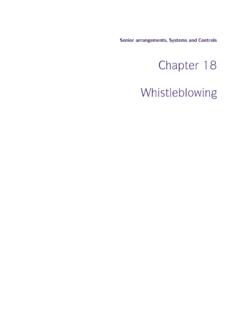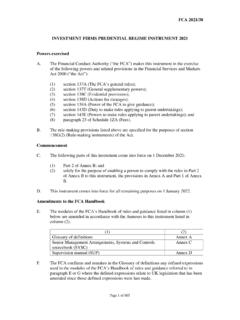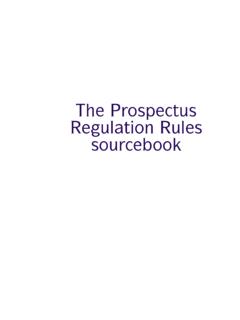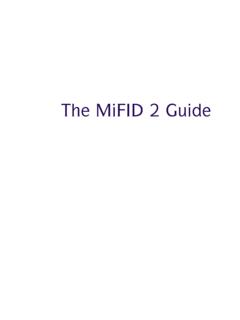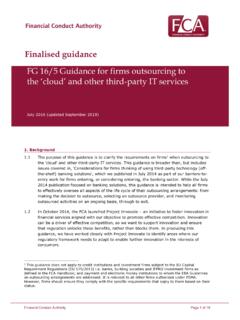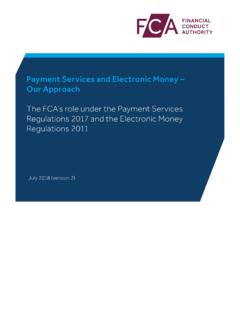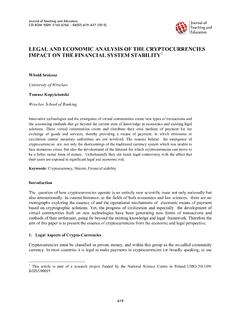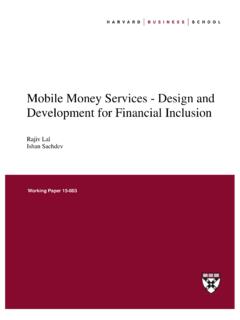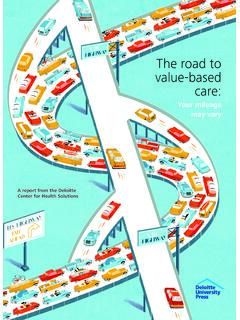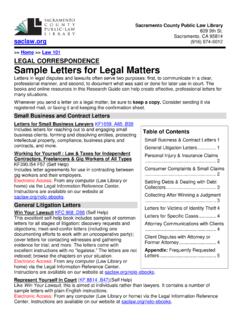Transcription of Chapter 15 Guidance on the scope of the Payment Services ...
1 The Perimeter Guidance ManualChapter 15 Guidance on the scope of thePayment Services Regulations2017 PERG 15 : Guidance on theSection : Introductionscope of the Payment ServicesRegulations 201715n Release 16l Feb 15 purpose of this Chapter is to help businesses in the UK consider whetherthey fall within the scope of the Payment Services Regulations 2017 (the PSRs 2017 ). The PSRs 2017 create a separate authorisation and registrationregime which differs from the authorisation requirements under theFinancial Services and Markets Act. In particular, it is aimed at helping thesebusinesses consider whether they need to be separately authorised orregistered for the purposes of providing Payment Services in the to individual regulations are to the PSRs 2017, unless PSRs 2017 implemented the Second Payment Services Directive (2015/2366/EC) (PSD2) in the United Kingdom.
2 The PSRs 2017 provide anauthorisation regime for Payment service providers which are neitherdeposit-takers nor electronic money relevant Payment Services are set out fully in Annex 2 to this chapterand include, amongst other things, Services relating to the operation ofpayment accounts (for example, cash deposits and withdrawals from currentaccounts and flexible savings accounts), execution of Payment transactions,card issuing, merchant acquiring, and money remittance. The PSRs 2017focuses on electronic means of Payment including direct debit, debit card,credit card, standing order, mobile or fixed phone payments and paymentsfrom other digital devices as well as money remittance Services ; they do notapply to cash-only transactions or paper cheque-based PSRs 2017 also creates authorisation and registration regimes for firmswho provide holders of online Payment accounts with Payment initiationservices and account information Payment service providers (including credit institutions and electronicmoney institutions) must comply with the conduct of business requirementsof the PSRs terms of scope , the PSRs 2017 are likely to be of relevance to a range offirms including credit institutions, electronic money institutions, the PostOffice Limited, money remitters, certain bill Payment service providers, cardissuers, merchant acquirers, Payment initiators, account aggregators andcertain electronic communication network service providers.
3 It is also likely tobe relevant to those agents of the above businesses which provide speaking, depending on the nature and size of its activities, abusiness to which the PSRs 2017 apply (other than a credit institution, anelectronic money institution and their agents) will need to be: authorised by the FCA as an authorised Payment institution; or registered as a "small Payment institution"; or registered as a registered account information Services provider; orPERG 15 : Guidance on theSection : Introductionscope of the Payment ServicesRegulations 201715n Release 16l Feb 15/3 registered as an agent of an authorised Payment institution, a smallpayment institution or a registered account information Services conditions for authorisation as a Payment institution are set out inregulation 6. In addition to the authorisation regime for paymentinstitutions, there is an alternative regime for those which fall within thecategory of small Payment institutions (that is businesses which meet theconditions in regulation 14).
4 Broadly, the category of small paymentinstitutions will only be relevant to firms executing Payment transactionswith a monthly average of 3 million euros (or an equivalent amount) or less,over a 12 month period and that do not carry on account informationservices or Payment initiation service. Broadly, small Payment institutions arenot subject to the requirements in Part 3 of the PSRs 2017 (including capitalrequirements), but they are subject to a registration regime and the conductof business provisions in Parts 6 and 7. There is a further registration regimefor Payment service providers providing no Payment Services other thanaccount information Services . The conditions for registration are set out inregulation 18. Registered account information Services providers must complywith certain conduct provisions, as set out in the PSRs 2017 also provide for the appointment of agents by authorisedpayment institutions, small Payment institutions and registered accountinformation Services providers.
5 These agents are not required to beauthorised under regulation 6 but they are required to be registered on theFinancial Services Register by their principal (or each of their principals). Abusiness can also provide Payment Services as an agent of a credit institution,in which case there are no registration requirements under the PSRs money institutions can provide Payment Services through agents,in which case the registration requirements of the electronic MoneyRegulations 2011 apply (see PERG 3A).Exemptions and exclusionsAs well as small Payment institutions, registered account information servicesproviders and agents, the PSRs 2017 make provision for a limited number ofexempt bodies, notably credit unions and municipal banks. The regulationsdo not apply to these bodies although municipal banks are required tonotify the FCA if they propose to provide Payment generally, there is a broad range of activities which do not constitutepayment Services under Schedule 1 Part 2 to the PSRs 2017.
6 Amongst theseexcluded activities, set out more fully in Annex 3, are: Payment transactions through commercial agents acting on behalf ofeither the payer or the payee; cash-to-cash currency exchange activities (for example, bureaux dechange); Payment transactions linked to securities asset servicing (for example,dividend payments , share sales or unit redemptions); Services provided by technical service providers (which does not includeaccount information Services or Payment initiation Services ); Payment Services based on instruments used within a limited network ofservice providers or for a very limited range of goods or Services ( limitednetwork exclusion ); and Payment transactions for certain goods or Services up to certain valuelimits, resulting from Services provided by a provider of electroniccommunication networks or Services ( electronic communicationsexclusion ).
7 PERG 15 : Guidance on theSection : Introductionscope of the Payment ServicesRegulations 201715n Release 16l Feb 15/4 These and other activities are the subject of Q&A in n PERG A firm willbe exempt from authorisation and registration requirements under theregulations to the extent that its activities fall within one or more of theexclusions in Schedule 1 Part 2 to the regulations. In each case, it will be forbusinesses to consider their own circumstances and whether they fall withinthe relevant exclusions. However, firms making use of the limited networkexclusion must notify us when the total value of Payment transactionsexecuted through relevant Services exceeds 1 million euros in any 12 monthperiod beginning on or after 13 January 2018, and we will assess whetherthe notified Services fall within this exclusion. Providers of electroniccommunications networks or Services providing Services falling within theelectronic communications exclusion must notify us and provide us with anannual audit opinion which testifies that the transactions comply with thevalue limits set out in that exclusion as directed.
8 See scope issuesAs explained in n PERG , Q13, the regulations also apply in limitedcircumstances to non- Payment service providers, if they provide a currencyconversion service. Likewise, a non- Payment Services provider which imposescharges or offers reductions for the use of a given Payment instrument isrequired to provide information on any such charges or reductions (seeregulations 58 and 141).TransitionalsSubject to the exclusions and exemptions outlined above, a person (otherthan a credit institution, an electronic money institution and certain otherspecified bodies such as the Post Office) is caught by the authorisation andregistration requirements of the PSRs 2017 when it provides paymentservices, as a regular occupation or business activity, in or from the UK. Thatsaid, there are important transitional provisions which delay the need forbusinesses authorised or registered under the Payment Services Regulations2009 to re-apply for authorisation or registration under the PSRs 2017,before and during an initial period after the commencement of regulationon 13 January 2018.
9 There is also a transitional provision applying toproviders of account information Services and Payment initiation serviceswhich were providing those Services before 12 January 2016 see does this Chapter work?The Chapter is made up of Q&As divided into the following sections: General (n PERG ) Payment Services (n PERG ) Small Payment institutions, agents and exempt bodies (n PERG ) Negative scope /exclusions (n PERG ) Territorial scope (n PERG ) Transitional arrangements (n PERG ) Tables n PERG 15 Annex 2 and n PERG 15 Annex 3)DefinitionsThe PSRs 2017 contain their own definitions which you can find in regulation2. We refer to some of these in the Q&A including " Payment transaction"," Payment account", " Payment instrument" and " money remittance".PERG 15 : Guidance on theSection : Generalscope of the Payment ServicesRegulations 201715n Release 16l Feb 15 does it matter whether or not we fall within the scope of the PSRs2017?
10 Broadly, when you provide Payment Services , as a regular occupation orbusiness activity, in the UK and these Services do not fall within an exclusion or exemption,you must be:(a) an authorised Payment institution; or(b) (c) a small Payment institution; or a registered account information Services provider; or(d) a credit institution (with a Part 4A permission to accept deposits); or(e) an electronic money institution; or(f) the Post Office Limited, Bank of England or government departmentsand local authorities; or(g) an exempt person (that is a credit union, municipal bank and theNational Savings Bank)(h) Unless you are one of the above (or acting as an agent see n PERG ),subject to transitional provisions you risk committing a criminal offenceunder regulation Is there anything else we should be reading?The Q&As complement, and should be read in conjunction with, the PSRs2017.
